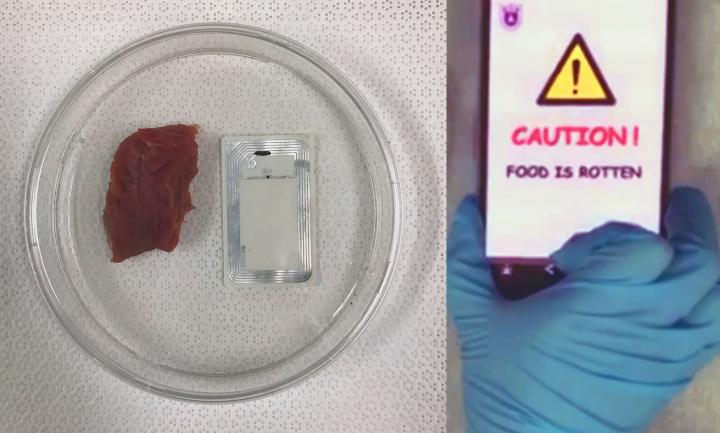
The ultimate 'smell test': Device sends rotten food warning to smartphones

A new wireless sensing device that detects odors from 'bad' meat could help prevent food poisoning.
Credit: American Chemical Society
Every year, 48 million people in the U.S. get sick from foodborne illnesses, according to the U.S. Centers for Disease Control and Prevention. Of these, about 125,000 people are hospitalized and 3,000 die.
Traditionally, many consumers just smell a food to detect spoilage, but this technique is only as reliable as the sniffer's nose. At the other end of the spectrum, food inspectors often use bulky, expensive equipment to detect harmful microbes.
Scientists are investigating other approaches, including near field communication (NFC) labeling, that are both portable and dependable. NFC devices wirelessly transmit information over short distances — usually less than 4 inches. They are similar to the radio frequency identification products retailers use to track inventory and shipments.
Building on this idea, Lijia Pan, Yi Shi, Guihua Yu and colleagues sought to incorporate a sensitive switch into NFC labeling tags to detect food spoilage using a smartphone.
The scientists created a nanostructured, conductive, polymer-based gas sensor that can detect substances called biogenic amines (BAs), which give decomposing meat its bad odor. They embedded these sensors into NFCs placed next to meats.
After the meats had been stored for 24 hours at 86 degrees Fahrenheit, the researchers found that the sensors successfully detected significant amounts of BAs. The sensors then switched on the NFCs so they could transmit this information to a nearby smartphone.
The authors acknowledge funding from the National Key Research and Development Program of China, the National Natural Science Foundation of China, the Alfred P. Sloan Fellowship and Camille Dreyfus Teacher-Scholar Award.
The paper's abstract will be available on June 27 at 8 a.m. Eastern Time here: http://pubs.
The American Chemical Society, the world's largest scientific society, is a not-for-profit organization chartered by the U.S. Congress. ACS is a global leader in providing access to chemistry-related information and research through its multiple databases, peer-reviewed journals and scientific conferences. ACS does not conduct research, but publishes and publicizes peer-reviewed scientific studies. Its main offices are in Washington, D.C., and Columbus, Ohio.
To automatically receive news releases from the American Chemical Society, contact newsroom@acs.org.












